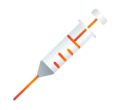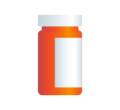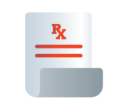What Are Adverse Drug Events?

In his years working in emergency medicine, St. John Fisher University Wegmans School of Pharmacy Associate Professor Shawn E. Fellows saw the dangers of adverse drug events (ADEs). As a pharmacist performing screenings for patients who were experiencing negative drug reactions after taking prescribed medications, he knows many ADEs are preventable.
“I started to get frustrated seeing a lot of sick patients that had preventable diseases or medication errors that could have been prevented before they got to the emergency department,” Fellows said.
That experience was the impetus for Fellows to transfer to chronic disease management. Now, Fellows provides clinical pharmacy services at a federally qualified health center where he serves patients with chronic illnesses and remains focused on preventing ADEs.
Pharmacists perform an important role in helping patients avoid ADEs. From providing patients with information on medication adherence to evaluating the risk for drug interaction, pharmacists offer crucial services but are underutilized as a resource for patient education. Individuals can empower themselves by utilizing pharmacists as a health care resource in addition to other health care providers to understand the potential effects of their medications and achieve the best outcomes.
What Are Adverse Drug Events?
The U.S. Department of Health and Human Services (HHS) considers an adverse drug event as “an injury resulting from medical intervention related to a drug, including medication errors, adverse drug reactions, allergic reactions, and overdoses.”
By that definition, the HHS reports that each year, in outpatient settings alone, ADEs result in:
>3.5M
Physician Office Visits
~1M
Emergency Department Visits
~125,000
Hospital Admissions
Fellows says that many ADEs are preventable. The risk can be substantially mitigated through both the work of interdisciplinary medical teams and a focus on strong patient education practices.
While any medication can potentially cause an adverse effect, certain types of medication can pose a higher risk.
According to Fellows, several medication classes have shown to produce the highest incidence of ADEs:

Insulin

Opioids

Anticoagulants
The Role of Pharmacists in Preventing Adverse Drug Events
Pharmacists may be involved in inpatient and outpatient settings as part of an interdisciplinary medical team to help guide decisions about prescriptions, Fellows said.
A community pharmacist can also serve as a point of prevention by providing information about new medications and reviewing patients’ medication lists when they fill a prescription.
“If you think about community pharmacies, that is typically the one central repository for all of the patients’ medications,” Fellows said. “We tell [patients] to use one pharmacy, where we can do a drug interaction check.”
How Can Adverse Drug Events Be Minimized?
Fellows says that patient education is an important factor in preventing ADEs.
“The patient needs to be familiar with what to monitor for and the potential side effects or interactions,” Fellows said. “Then you have an informed patient, so they can actually know that they are having an adverse effect.”

Ways to Manage Medications
There are many steps individuals can take to manage their medications and help prevent adverse drug events:
- Keep an updated list of your medications. This can be helpful to reference in situations where a provider does not have your full medication history. Be sure to date the last time updated.
- Use one pharmacy when possible. By filling prescriptions at one central location, such as a community pharmacy, your pharmacist can best screen for potential drug interactions as they are a central repository for prescriptions received from multiple providers caring for a patient.
- Take medications only as directed. Fellows said patients will sometimes attempt to “self-titrate” their dosage when their levels (e.g., blood sugar) are higher or lower than expected, which can lead to an accidental overdose.
- Keep up with recommended testing. According to the Centers for Disease Control and Prevention (CDC) resource for ADE prevention, common medications that can require monitoring include blood thinners as well as medicines for managing diabetes, seizures, and heart conditions.
- Use your pharmacist as a resource. Questions individuals can ask their pharmacist include:
- Can you clarify instructions for timing and dosage of my medication?
- What potential side effects should I be most concerned about?
- What signs or symptoms should I look for?
- Do you have any concerns about the other medications I am currently taking?

What To Do if You Experience an Adverse Drug Event
Fellows said it is important to remember, “we don’t know what we don’t know,” in regard to ADEs. A patient may not always be aware that the symptoms they are experiencing are related to their medication. In many cases, pharmacists can serve as a helpful point of contact for ADE concerns.
“Pharmacists are typically the most accessible health care provider in the U.S.,” Fellows said. “The pharmacy is one of the few places you can go and get free, reliable health information—you’re bringing it to somebody’s attention, and then they can help to triage that.”
How a Pharmacist Can Help
In non-life-threatening situations where you are experiencing symptoms that you were warned to look for (e.g., mild nausea), a pharmacist can answer questions about side effects that you are feeling. A pharmacist may also suggest what the next steps should be, such as contacting your provider or going to urgent care, and if needed, the emergency department.
Pharmacists are involved in outpatient and inpatient scenarios as well, Fellows said. Interdisciplinary teams in both settings often incorporate a clinical pharmacist who serves as a drug information expert and helps to avoid, screen for, and manage ADEs.
When to Seek Immediate Care
When you are experiencing more serious symptoms, such as bleeding, shortness of breath or chest pain, consider calling 9-1-1 for immediate attention. Urgent care units are also available in communities where a hospital may not be readily accessible.
Please note that this article is for informational purposes only. Individuals should consult their health care provider before following any of the information provided.
Citation for this content: St. John Fisher University’s online Pharm.D. program from the Wegmans School of Pharmacy


